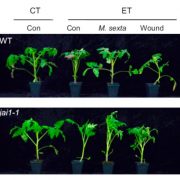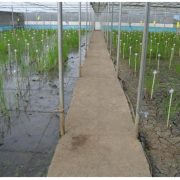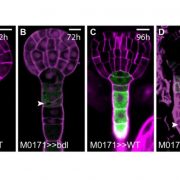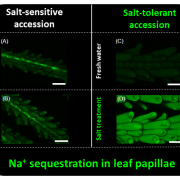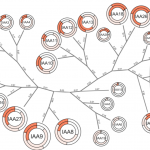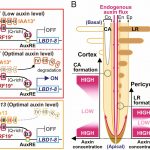Auxin-sensitive AUX/IAA proteins mediate drought tolerance in Arabidopsis by regulating glucosinolates levels ($) (Nature Communication)
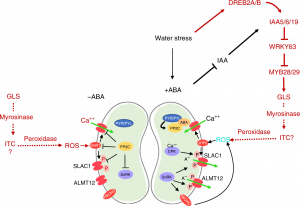 Glucosinolates are secondary metabolites synthesized by plants as a defense compound against pathogen and herbivore. In this paper Salehin et al., have demonstrated regulation of aliphatic glucosinolate levels by auxin signaling that promotes drought tolerance in Arabidopsis. The Aux/IAA proteins are coreceptors of auxin and repress the activity of AUXIN RESPONSE FACTOR (ARF) bound to it. Of the 29 Aux/IAA genes, there are redundant and specific functions to each member adding complexity to auxin signaling in plant development and stress response. Under a water deficit condition, the levels of aliphatic glucosinolates were down-regulated in the iaa5,6,19 mutants suggesting a potential role of IAA5,6 and 19 are essential for drought tolerance. Further, it has been shown that these AUX/IAA proteins are necessary for stomatal regulation and altered glucosinolate levels in the iaa5,6,19 mutants lead to defective stomatal regulation. Overall this paper has shown another role of the phytohormone, auxin in regulating glucosinolate levels and drought tolerance in Arabidopsis. Summary by Suresh Damodaran. Nature Communication, DOI: 10.1038/s41467-019-12002-1
Glucosinolates are secondary metabolites synthesized by plants as a defense compound against pathogen and herbivore. In this paper Salehin et al., have demonstrated regulation of aliphatic glucosinolate levels by auxin signaling that promotes drought tolerance in Arabidopsis. The Aux/IAA proteins are coreceptors of auxin and repress the activity of AUXIN RESPONSE FACTOR (ARF) bound to it. Of the 29 Aux/IAA genes, there are redundant and specific functions to each member adding complexity to auxin signaling in plant development and stress response. Under a water deficit condition, the levels of aliphatic glucosinolates were down-regulated in the iaa5,6,19 mutants suggesting a potential role of IAA5,6 and 19 are essential for drought tolerance. Further, it has been shown that these AUX/IAA proteins are necessary for stomatal regulation and altered glucosinolate levels in the iaa5,6,19 mutants lead to defective stomatal regulation. Overall this paper has shown another role of the phytohormone, auxin in regulating glucosinolate levels and drought tolerance in Arabidopsis. Summary by Suresh Damodaran. Nature Communication, DOI: 10.1038/s41467-019-12002-1



